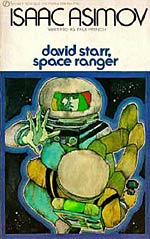
![]() Darling
Darling
3/29/2012
![]()
This story is truly a product of its times, and I suspect Asimov, though most authors would never admit this, was somewhat embarrassed by it. I've not seen why he used a pseudonym for this series, but I could guess. It, like Hardy Boys, Nancy Drew, and Tom Corbett behaves like a serial children's novel. It is part SF, part mystery, and part superhero story. Since the superhero element is so close to the crisis of the story, I won't reveal it, but suffice it to say that it is a gimmick that might work for children (not young adults) but most grown ups will shake their heads and, if they are the indulgent type, smile.
David Starr is the kind of clean-cut hero parents of the 1950s wanted to see their kids reading. The closest we get to a female character is a disembodied voice. The story is almost as if men spontaneously generated from the thin Martian dust. On the other hand, Starr is too smart for his adult manipulators. The Council of Science leaders try to manipulate him, but he is on to them and does what they want anyway, confident that he can carry off the program and still maintain secrecy. Likewise, the Council Rep on Mars is uncertain of this young man he has been ordered to trust, and is confused every step of the way, till Starr saves the day. Finally, his origins in a tragic loss of his parents and an extended time in space being bombarded by cosmic rays gives him the feel of a proto-Fantastic Four character, cum messiah. Who is this young man, where did he come from, and how did he become such a prodigy?
In the edition I read, Asimov entered a preface not quite apologizing for the outdated Mars science. By now, anyone reading a Mars story written before the 1970s knows they are reading a mythology more than science. In those days, with inadequate instrumentation, scientists were interpreting the planets as best they could using equal parts science and wishful thinking. Nobody expects Kim Stanley Robinson's Red Mars from a 50s Asimov or an ERB. These storys do not, though they should, serve to humble our trust in science. Scientists thought they were giving answers when all they were really doing was their best under the circumstances. That's all they're still doing.
I hate to say it, (goodness knows, I like books too much to be a negative reviewer) but Asimov will probably not last. Certainly David starr will not. Our culture has moved on to a more dynamic and a darker serial protagonist. Kids are not so naive as to think the Space Ranger can come through. However, if they're young enough, they might enjoy it, if they can get through the tech. So, perhaps reading Starr aloud to your elementary kids is about where we can expect this book to find a niche. I might read two more because I bought them, or I might just sell the whole pack to a used book store.